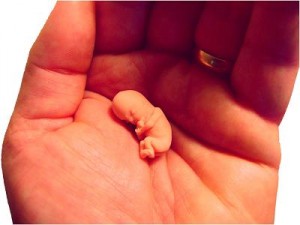Democrats are the True Abortion Extremists
 With fewer than three-dozen reckless words uttered in a local television interview, U.S. Rep. Todd Akin managed to do what President Barack Obama, erstwhile Obama cheerleader Sen. Claire McCaskill and the entire Democratic Party have struggled unsuccessfully to do for months now: Knock the Republican Party off message and distract voters from their own failed leadership.
With fewer than three-dozen reckless words uttered in a local television interview, U.S. Rep. Todd Akin managed to do what President Barack Obama, erstwhile Obama cheerleader Sen. Claire McCaskill and the entire Democratic Party have struggled unsuccessfully to do for months now: Knock the Republican Party off message and distract voters from their own failed leadership.
Democrats, of course, are elated — and none more so than McCaskill, who ranked among the most vulnerable incumbents in the Senate before her opponent attempted to answer a question about abortion and rape by positing that in cases of “legitimate rape,” women’s bodies can “shut that whole (conception) thing down.”
Akin, a staunchly pro-life six-term congressman who won the Republican primary with the help of laudatory ads and some reported crossover votes from the McCaskill camp, may have had his heart in the right place, as his mea culpa TV spots and many grassroots supporters attest. And it’s true that the wall-to-wall media coverage of Akin’s blunder contrasts sharply with the virtual blackout of gaffes by Democratic candidates, including Vice President Joe Biden’s racially tinged recent warning to a largely African-American audience that if former Massachusetts Gov. Mitt Romney is elected, “They gonna put y’all back in chains.”
It’s also true that politicians such as Obama, Biden and McCaskill rarely are called to account for their slavish adherence to the abortion-rights absolutism of groups such as NARAL Pro-Choice America, which has given each of them perfect scores in recent years for toeing the no-restrictions line on abortion. Pro-life legislators, meanwhile, routinely get grilled about abortions in cases of rape or incest, which account for less than 1.5 percent of all abortions in the U.S., according to a 2005 study by the Guttmacher Institute, a research organization founded by Planned Parenthood.
Media bias in favor of legalized abortion is an old story, however, and any pro-life Senate candidate should be prepared to answer tough questions on the issue, no matter how peripheral they may be to our current policy debates.
Akin’s mistake was not his defense of unborn human life in all circumstances — a principled position grounded in the truth that one human rights violation cannot justify another and no innocent child deserves to die for her father’s crimes. Akin’s error was attempting to blunt the effect of his position by floating a baseless theory about the rarity of rape-induced pregnancies. Abortions attributed to rape may be rare, but pregnancies can and do happen after rape. And in those hard cases, commitment to the sacredness of every human life can be sorely tested.
Happily for voters who do not share Akin’s opposition to abortion in those cases — and unhappily for those who do — the issue is a nonstarter in today’s political climate. It took nearly a decade for federal lawmakers to push through the 2003 ban on partial-birth abortion, a gruesome and medically unnecessary procedure that involves the extraction of a fetus limb by limb and the suctioning of her brain so she can be delivered dead. A Republican-led attempt this spring to ban sex-selective abortion — the practice of killing unborn children, usually girls, merely because of their gender — died at the hands of House Democrats, who quashed it with Obama’s blessing. Meanwhile, Obama is moving forward with a mandate that forces religious institutions to offer coverage of potentially abortion-inducing drugs despite their conscientious objections. The notion that Congress is just one senator away from outlawing abortion in cases of rape — a position that even Romney rejects — is ludicrous.
Equally laughable is the idea that the Democratic Party, and abortion-rights stalwarts Obama and McCaskill in particular, represent the “mainstream” of American opinion on abortion. Given that a May Gallup poll that found 50 percent of Americans identifying as “pro-life” and a record-low 41 percent identifying as “pro-choice,” it seems that Democrats, not Republicans, are increasingly the outliers on abortion.
And the Democratic Party’s abortion-rights zealotry grows more extreme every year. In President Bill Clinton’s day, Democratic leaders still called for abortion to be “safe, legal and rare.” In 2008, the party stripped “rare” from its platform language and nominated Obama, who opposed the bipartisan partial-birth abortion ban in the U.S. Senate and voted three times in the Illinois Legislature to kill his state’s version of the Born-Alive Infants Protection Act, which aimed to protect and provide basic care to babies that survived abortions.
Now Democrats are gearing up for a national convention dominated by such hard-core abortion-rights activists as NARAL president Nancy Keenan, contraceptive mandate champion Sandra Fluke and Planned President Cecile Richards — whose organization has faced its own embarrassing questions about enabling statutory rape, thanks to undercover sting operations at its clinics conducted by Live Action and Life Dynamics.
McCaskill plans to skip the convention. But distancing herself from Obama’s failures and her party’s extremism may not be as easy as steering clear of Charlotte. McCaskill boasts a perfect score in abortion-rights rankings from Planned Parenthood, relies heavily on campaign funding from out-of-state abortion-rights groups such as EMILY’s List and has to answer to her constituents for backing Obamacare and refusing to support legislation that would have expanded religious-liberty protections for employers targeted by Obama’s contraceptive mandate.
Missourians have watched McCaskill march in lockstep with her president and her party at every crucial juncture in the past six years. For many of them, not even Akin’s atrocious blunder can erase that bitter memory.

